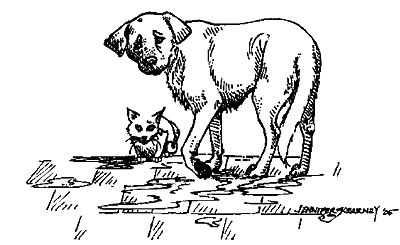
Illustration by Jennifer Kearney
|
|
By Ella Peterson
Arizona Daily Wildcat
Friday, September 16, 2005
Print this
In the days after Hurricane Katrina, the city of New Orleans was flooded with more than water, as donations and offers of assistance poured from the people of America. Their response was, and continues to be, an amazing force of charity and concern. However, one group affected by the devastation has received much less aid and national attention, and those who would assist them struggle against time and finance to do so.
There are tens of thousands of dogs and cats still needing rescue from the city of New Orleans and surrounding areas. Many of these animals were well-loved pets that found themselves the victims of forced abandonment, as their reluctant owners were forced to flee. Dogs barked from rooftops, and cats roamed the streets or hid under furniture until rescue workers came to save them. Some of the surviving animals will never see their families again, but thanks to the efforts of many organizations, many of them will.
Organizations like the Humane Society of the United States and others are working feverishly to relieve the situation of these overlooked survivors. There have been great efforts made by small organizations that have saved thousands of animals and are struggling to find them homes or reunite them with their owners. Web sites like www.petfinder.com and others provide a way for worried people to find their pets, in addition to being a valuable resource for those interested in donations, or fostering or adopting an animal left homeless by Katrina.
These groups are working extremely hard day and night; however, there are obstacles to be overcome in this endeavor. Hundreds of organizations are receiving millions of dollars in donations for the alleviation of human suffering. Only a handful of organizations work toward the rescue of the animals affected, and they tend to be overlooked in the overall generosity of the public.
The sheer size of the problem presents a logistical and financial conflict to the rescue efforts. No matter how many animals are cleaned, fed and vaccinated, thousands more still struggle with a lack of shelter, no clean water and rampant disease.
On Sunday, an airlift flew 80 dogs out of New Orleans to temporary homes in California. However, logistical requirements make this type of large-scale relocation difficult to complete quickly or repeatedly.
Rescuers struggle to vaccinate, vet check and microchip (for future identification purposes) each pet as quickly as possible, but the shelters fill quickly and there are always more coming. Chartered by a Texas oil tycoon for a half-million dollars, planes like the one that barked its way to the West Coast are obviously not going to be common or easy to come by.
Grassroots offers of help to the Humane Society and others have always been an integral part of nature conservation and animal rescue, and that is still true now.
Initiatives taken by private sources are the kind of actions that inspire and uplift the cause in others.
An organization called Pasado's Safe Haven is working with animal shelters in Louisiana and Mississippi to bring adoptable animals from the affected areas to Tucson, where they have a chance to be adopted.
Susan White, an associate professor in the department of English, is working with this organization to raise funds and contact potential adoptive homes for these animals.
"Our hope is to form a network that will bring animals to Tucson for adoption or fostering. It is crucial to work with a reputable agency to make sure that animals are really available for adoption," White said.
Of course, no one is asking you to drive straight off to Louisiana to volunteer, or to charter a half-million-dollar plane. But if you were perhaps thinking of getting a cat or a dog, and maybe hadn't quite gotten around to it yet, why not consider contacting one of the organizations involved and adopting a Katrina pet?
"If you want to adopt an animal, please think of your local Animal Control Center where there are animals who need homes desperately," said White. "However ... it is vital to offer help to the shelters in the Katrina disaster area because they have little hope of being able to place animals locally as they are so overrun."
If there's no room at the inn (or in the apartment) and you still want to help, donate to a less visible organization of heroes - no more or less noble than those getting most of the media attention but simply as often overlooked as the animal lives they save.
Ella Peterson is a creative writing junior. She can be reached at letters@wildcat.arizona.edu.
